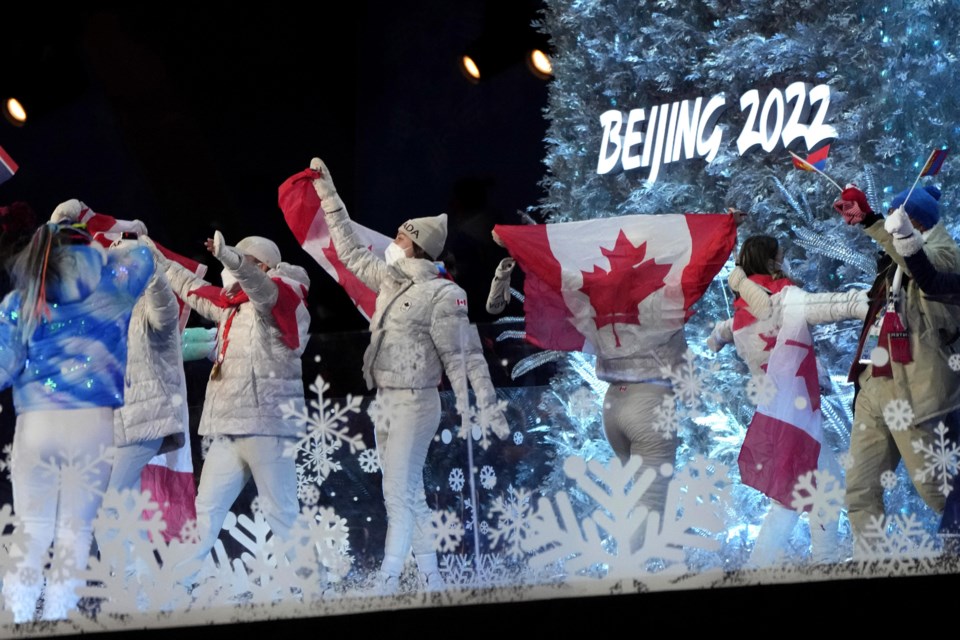BEIJING — Isabelle Weidemann carried the Canadian flag into Beijing's National Stadium on Sunday, as the second Olympic Games of the COVID-19 pandemic era officially came to a close.Â
International Olympic Committee president Thomas Bach officially declared the end of the Beijing Olympics, thanking China for staging the Games in a "safe way."
Bach and Chinese President Xi Jinping stood together as Beijing handed off to Milan-Cortina, site of the 2026 Winter Games. “Twinkle, Twinkle, Little Star” kicked off a notably western-flavoured show with Chinese characteristics as dancers with tiny, fiery snowflakes glided across the stadium in a ceremony that, like the opening, was headed by Chinese director Zhang Yimou.
“We welcome China as a winter sport country," Bach said, closing the Games. He called their organization “extraordinary" and credited the Chinese and their organizing committee for serving them up “in such an excellent way and a safe way.”
Earlier, Weidemann's teammates – 220 of them to be exact – representing an array of sports followed her into the stadium as the closing ceremony got underway.
Weidemann, who won gold in the women's team pursuit, silver in the 5,000-metre race and bronze in the 3,000 metres, performed the duties as Canada's flag-bearer following the country's 26-medal performance in China.
But each Canadian athlete sporting head-to-toe "winter white" attire who joined the 26-year-old from Ottawa draped their own versions of the Maple Leaf over their shoulders, tied it around their necks like capes or waved it proudly in their hands.
The Canadian Olympic team posted "BYOF" to Twitter – "bring your own flag" – along with a picture of some of the athletes.Â
The masked Canadians, who wore red at the opening ceremony Feb. 4, also took selfies, recorded videos and danced amidst a throng of fellow Olympians on the floor of the massive venue nicknamed the "Bird's Nest" for its unique outer structure.
Figure skater Eric Radford hoisted partner Vanessa James into the air with one arm in a unique moment during the athlete march on a cool, clear night in the Chinese capital.
Canada finished fourth in the overall medal race in China behind Norway's 37, the Russian Olympic Committee's 32 and Germany's 27. The United States was fifth with 25.
Norway also led with 16 gold medals, while Canada was 11th with four podium-topping performances.
Canada won 29 medals – including 11 golds – to finish third overall at the 2018 Winter Games in Pyeongchang, South Korea.
Beijing National Stadium hosted the opening and closing ceremonies for the 2008 Summer Olympics.
The extinguishing of the Olympic flame in Beijing marked the end of the most locked-down Games in history.
It was the second pandemic Olympics in the more than two years since the coronavirus first emerged in China.
The movements of athletes, media and workers were heavily restricted and everyone wore masks and took daily COVID tests. There were only 463 positive COVID tests reported among thousands of people who came to Beijing for the Games.
Internationally, many denounced the IOC for holding the Olympics in concert with a Chinese government accused of human rights violations. Several western governments, including Canada's, boycotted by not sending any official delegations, though they sent athletes. China denied such allegations.
Attention now turns to 2024 in Paris, where officials hope for a COVID-free and scandal-free Summer Games.
-- With files from The Associated Press
This report by The Canadian Press was first published Feb. 20, 2022.
Joshua Clipperton, The Canadian Press

